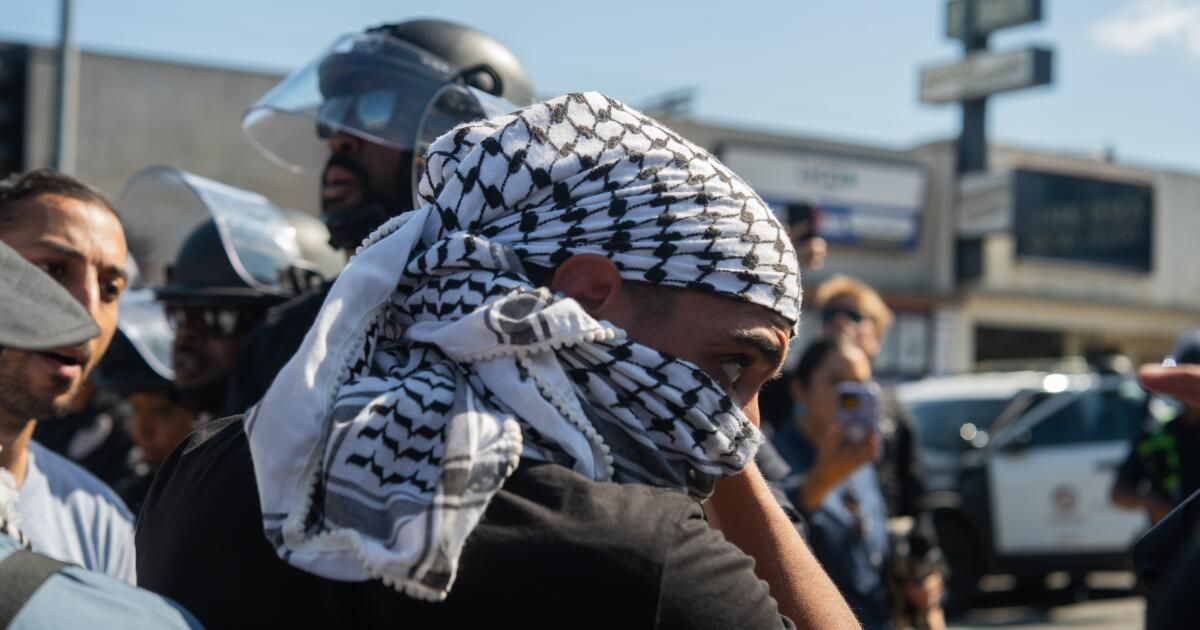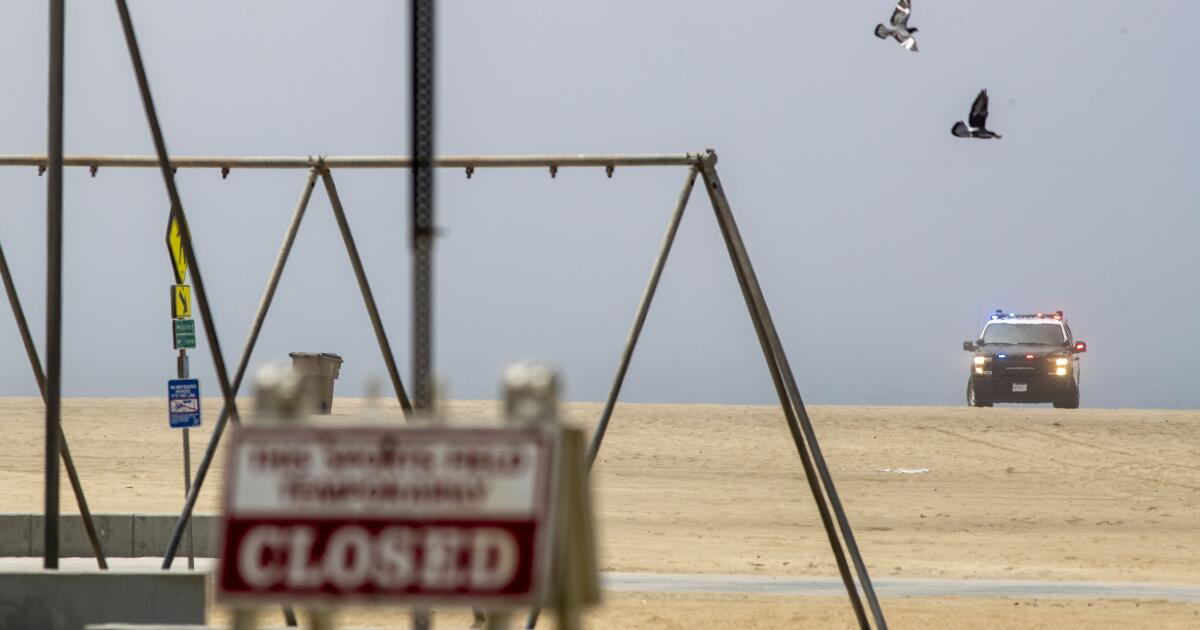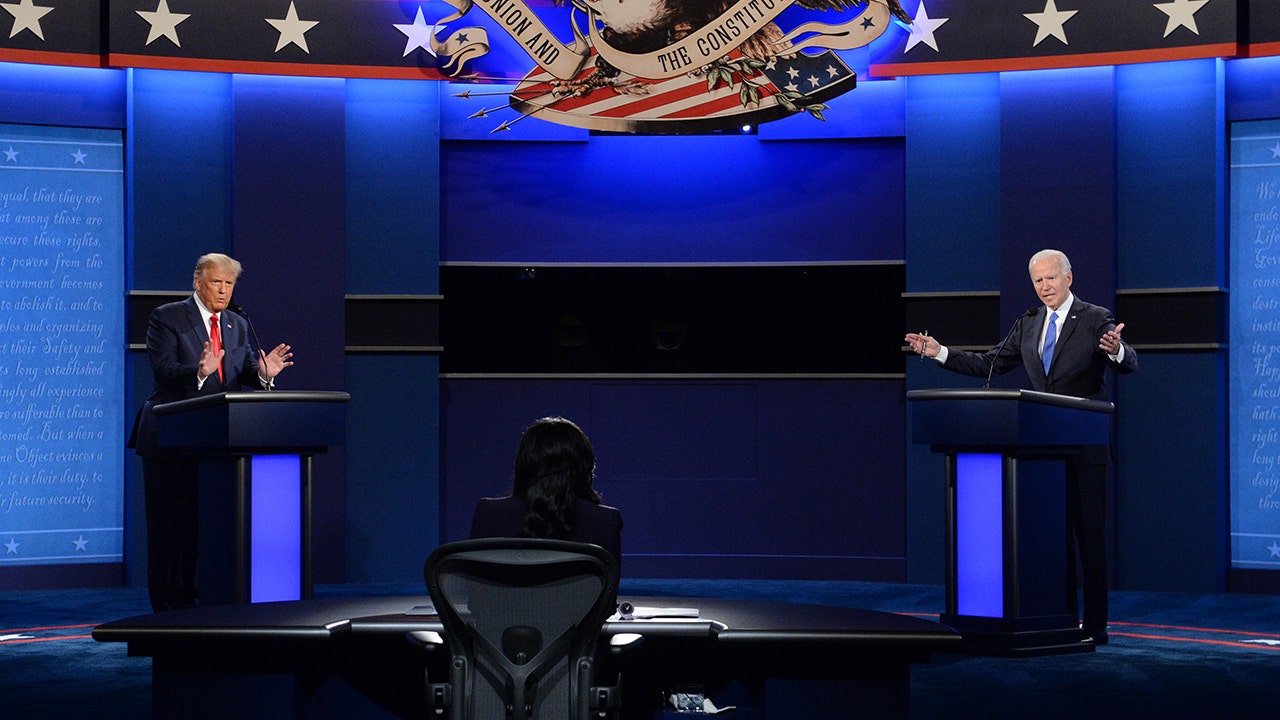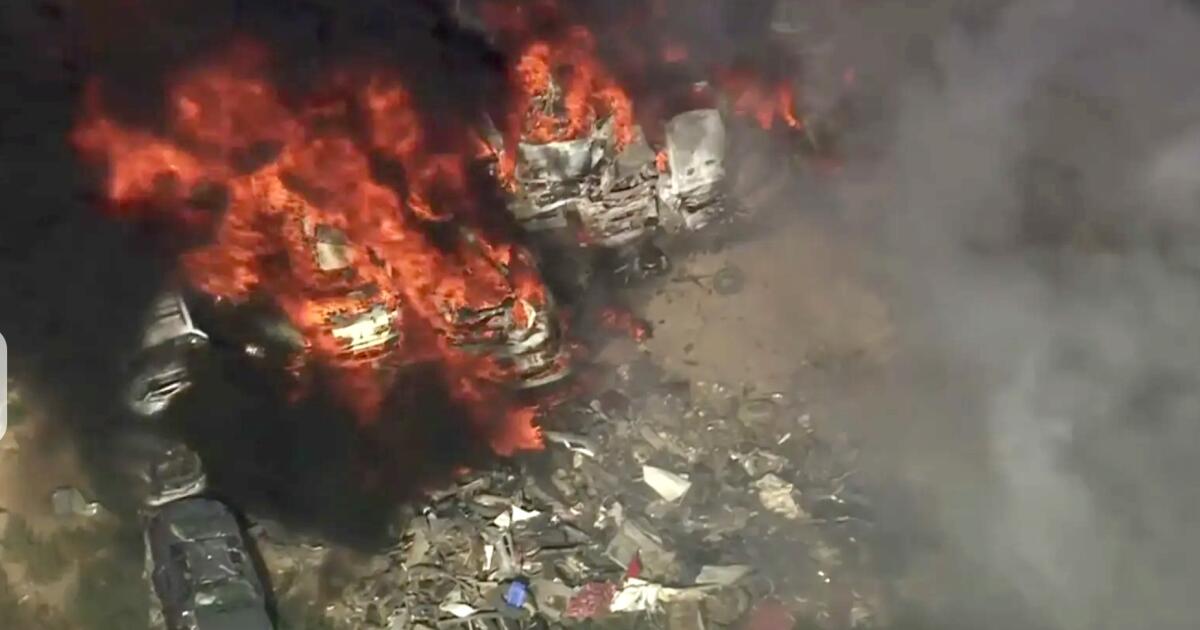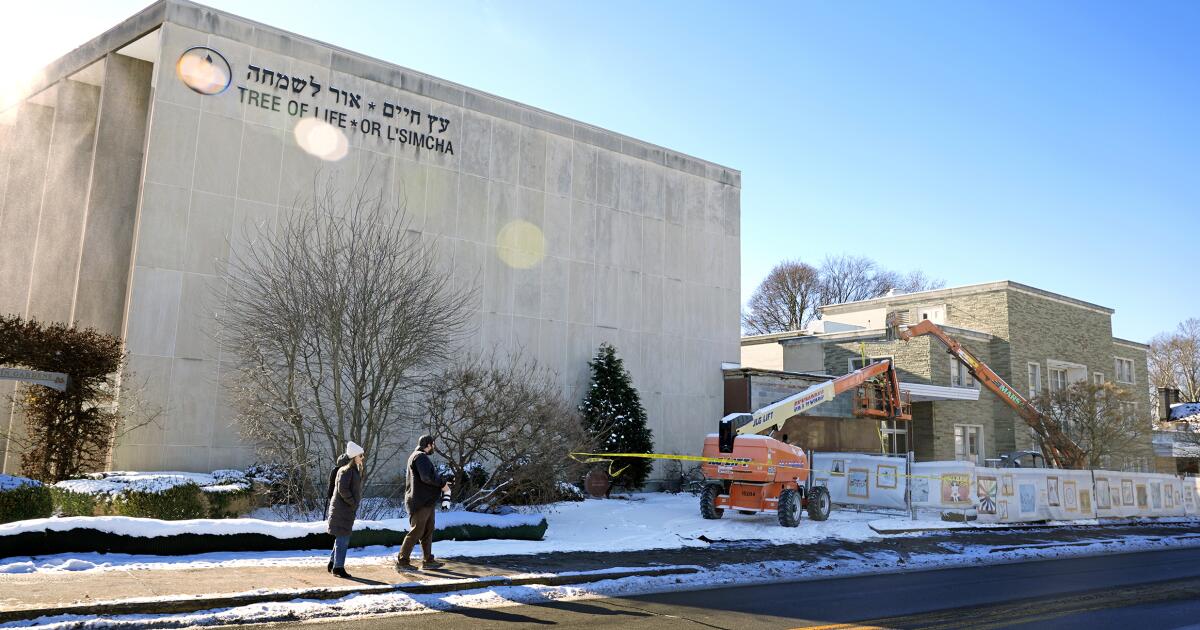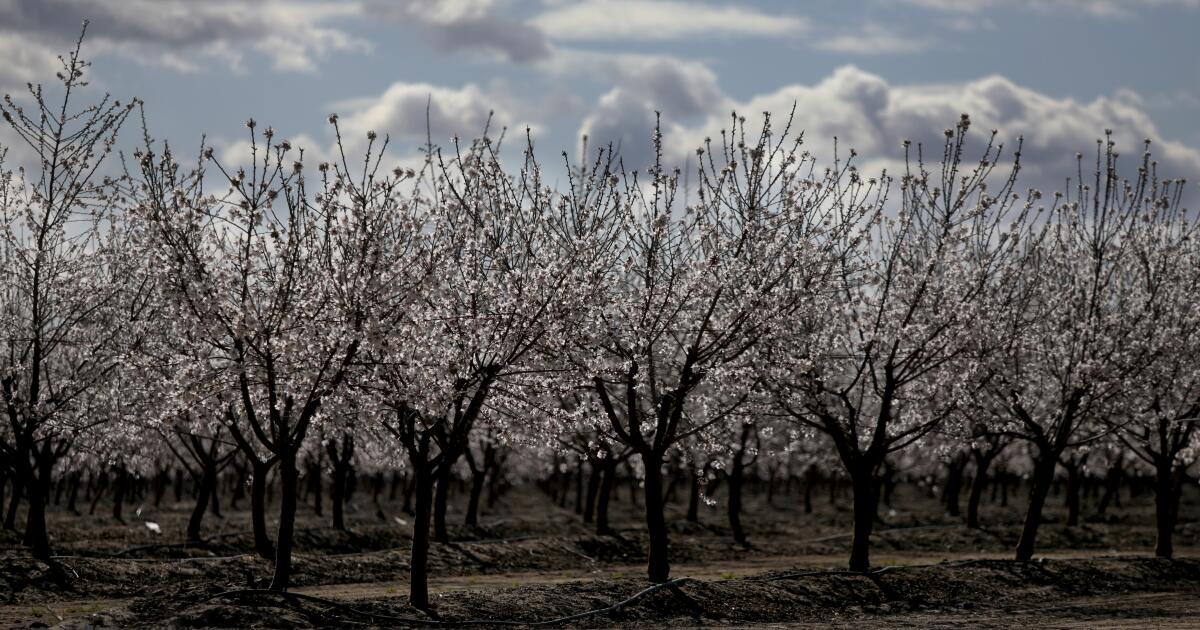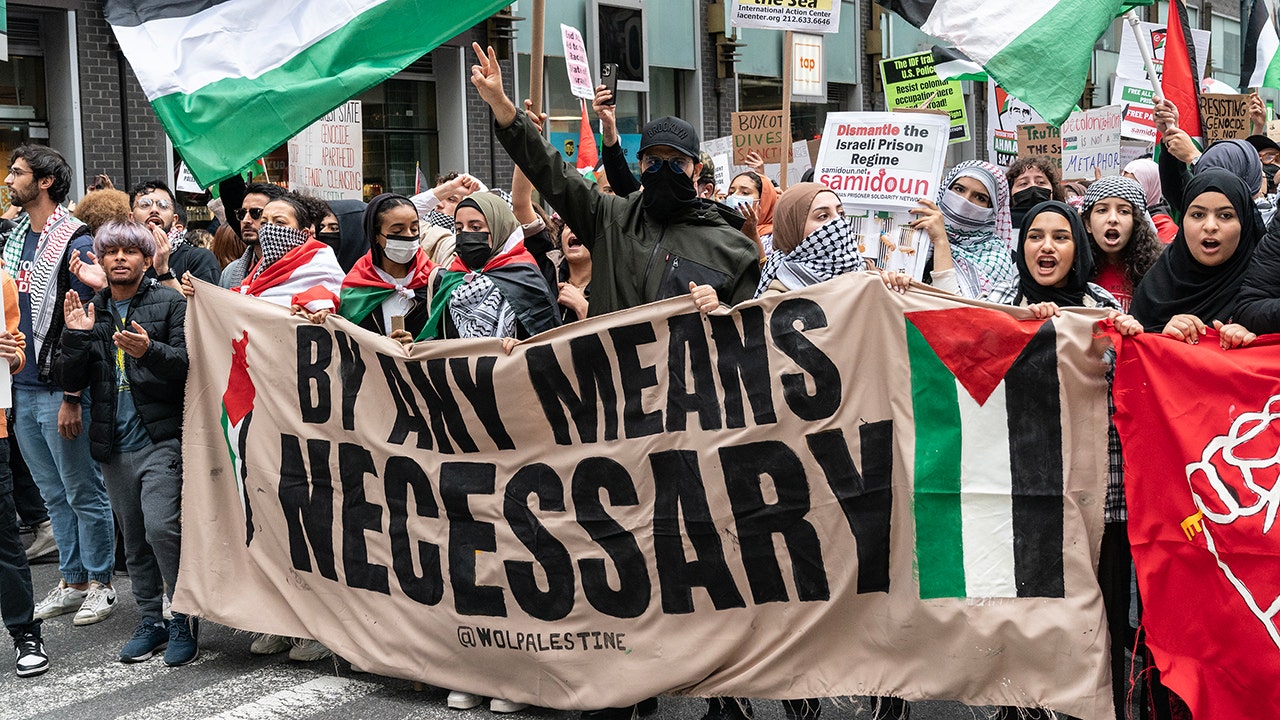Sunday's violent protest at a synagogue prompted Mayor Karen Bass to say Los Angeles should consider rules governing demonstrations and the wearing of masks by protesters.
On Monday, Bass did not offer a proposal, but said the city needed to look at the issue, including “the idea of people wearing masks at protests.” Several pro-Palestinian protesters had their faces covered on Sunday.
The mayor, in an afternoon news conference, also said she was seeking city and state funding for additional security measures at the city's places of worship. Hours after the clashes, she ordered the Los Angeles Police Department to increase patrols in the predominantly Jewish Pico-Robertson area where the protest occurred and at religious sites.
Masks have been part of many pro-Palestinian and some pro-Israeli protests over the war in Gaza, including on college campuses.
When a mob attacked a pro-Palestinian camp at UCLA in May, it was difficult to identify the suspects because many were wearing masks that concealed their identities. Police said they would use technology that captures images and facial contours and compares them with other photographs on the Internet and social media to give names to the faces.
It is unclear how the government could restrict the use of masks at protests.
During the 2020 George Floyd protests, some health officials urged protesters to wear masks to protect against COVID-19. Although coronavirus cases have dropped dramatically since then, masks can still offer protection, especially to those with underlying health conditions.
Earlier this month, New York Governor Kathy Hochul said she was considering banning masks on the New York subway, saying she was concerned that people wearing masks would commit anti-Semitic acts.
“We will not tolerate people wearing masks to evade responsibility for criminal or threatening behavior,” Hochul told reporters at a news conference. “My team is working on a solution. But on the subway, people should not be able to hide behind a mask to commit crimes.”
New York Mayor Eric Adams supported the idea, telling reporters that “cowards cover their faces.”
Some civil liberties advocates opposed the idea.
“The mask ban was originally developed to crush political protests, and like other laws that criminalize people, they will be applied selectively: they will be used to arrest, surveil, and silence people of color and protesters they meet.” the police don't agree,” said executive Donna Lieberman. the director of the New York Civil Liberties Union said in a statement, according to the Associated Press.
North Carolina has also been talking about a mask ban, citing protests over the Gaza war. But there has been opposition from some health professionals and people with underlying health problems.
One North Carolina resident told the Washington Post: “I thought I should wear masks with something printed on them like 'immunocompromised' or 'cancer patient.' But we shouldn't have to do that.”
A new proposal now includes health exemptions.
There have been no formal proposals in Los Angeles and it is unclear whether the City Council would support the idea.
But a local Anti-Defamation League official on Monday expressed support for a mask restriction. Jeffrey Abrams, the ADL's regional director in Los Angeles, took the stage alongside Bass at the afternoon news conference and said the city needed to do more to protect the community.
“As Mayor Bass said, we must look at all available legal tools, just as the city attorney looks at existing anti-masking laws in the state of California,” Abrams said.
Sunday's protest was condemned by top officials, including Bass, President Biden and Governor Gavin Newsom.
A pro-Palestinian protester gets into a car surrounded by pro-Israel counterprotesters near the Adas Torah synagogue on Sunday.
(Zoë Cranfill / Los Angeles Times)
The protest began Sunday afternoon at the Adas Torah synagogue in the predominantly Jewish neighborhood of Pico-Robertson, but eventually spread to nearby areas for several hours. Fights broke out between pro-Palestinian protesters (who said they were protesting an event at the synagogue promoting the sale of stolen Palestinian land) and supporters of Israel.
“Yesterday was abhorrent and blocking access to a place of worship is absolutely unacceptable,” Bass said Monday. “This violence was designed to stoke fear. It was designed to divide. But hear me loud and clear: you will fail.”
“Bullying Jewish worshipers is dangerous, unconscionable, anti-Semitic and un-American,” the president said in a statement. “Americans have the right to peacefully protest. But blocking access to a place of worship and engaging in violence is never acceptable.”
Police sources said the event was advertised in Friday's edition of the Jewish Journal promising to provide information on “housing projects in Israel's best Anglo-Saxon neighborhoods.” “Anglo” is a direct translation from Hebrew meaning “English-speaking.” The advertisement does not specify where in Israel the real estate is located.
Protest fliers posted on social media read, “Our land is not for sale” and condemned “land theft,” according to an Instagram post by the Southern California chapter of the Palestinian Youth Movement, which did not immediately respond to requests for comment on Monday. .
Hussam Ayloush, executive director of the Council on American-Islamic Relations office in Los Angeles, said the rally location was chosen not because it was in front of a synagogue but because of the event it was hosting.
The protest “was in response to the flagrant violations of both international law and human rights by agencies seeking to make profits by selling brutally stolen Palestinian land as the Israeli government continues its eight-month genocidal and ethnic cleansing campaign in Gaza.” he said in a statement.
“Elected officials and the mainstream media have politicized this incident as religious discrimination and not a human rights issue,” Ayloush added.
Rabbi Hertzel Illulian, founder of the JEM Community Center in Beverly Hills, arrived at Adas Torah on Sunday to worship during afternoon prayer and was confronted by a group shouting into megaphones. Some visitors to the synagogue were prevented from entering, he said.
“We couldn't pray properly because the people outside were screaming,” he said.

